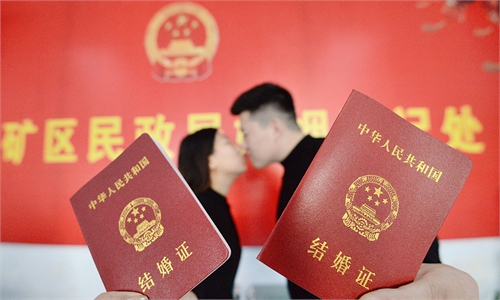
File Photo: IC
Ordering takeout food for lunch at the office, grabbing some food for dinner at a convenient store after work, trying a fine restaurant alone on a Friday night and climbing mountain on her own on a weekend. These are part of Yang Yang's regular life as a 31-year-old single woman.
She moved to Beijing five years ago and has been single for more than one year. Now, she is living by herself and earns more than 10,000 yuan per month. Yang told the Global Times that she hardly saves any money every month.
Yang's daily life is a reflection of many Chinese single people. According to China Central Television (CCTV) , 40 percent of singles in first-tier cities belong to the "moonlight clan", mostly young people who live paycheck to paycheck. In lower city-tiers with lower monthly income, the proportion of the "moonlight clan" has risen sharply and 76 percent of single young people living in fourth and fifth-tier cities run out of money every month.
According to data released by data analytics company Nielsen, 42 percent of singles spend for self-indulgence, compared to 27 percent of non-single consumers.
The number of single adults reached 240 million in 2018. More than 77 million of those adults live alone and that number is expected to rise to 92 million by 2021, according to China's Ministry of Civil Affairs.
They have converged into a huge new purchase power, giving birth to a new concept of s singles self-indulgence spending.
"Single consumers do not bear the responsibility of supporting their parents and children. They will mainly spend for themselves and to please themselves only," Yin Zhichao, the head of the School of Finance at the Capital University of Economics and Business, told the Global Times on Sunday.
Spending for self-indulgence
Singles spend on one-person entertainment. A quick getaway, a movie, a favorite meal, they're willing to do whatever it takes to please themselves.
Yang takes two week-long trips and several short holidays for herself every year. She traveled alone to Aranya beach in Qinghuangdao, North China's Hebei Province, one weekend of November last year, just to enjoy the sunset on beach and have a look of the local architecture.
Yang always uses the time for the national holidays to take a one-week trip. On the past National Day holidays she travelled to Gannan, Tibetan Autonomous Prefecture, in Northwest China's Gansu Province to enjoy the beautiful scenery by herself. She is planning to visit Chengdu, in Southwest China's Sichuan Province, to try its delicious spicy food during this year's May Day holidays.
"The advantage of traveling alone is that you can go as soon as you decide, completely at your own convenience, such as travel time, destination, itinerary, and choice of hotel and dining," Yang said.
However, there is no one to share the hotel bill with. It normally costs Yang around 8,000 yuan for a long haul trip and 1,000 yuan for a short trip.
"I work hard every day to earn money and I spend it as I wish. As a single woman with no family to support, I will never save money on food and travel to indulge myself," she noted.
Single people are also more willing to spend money to find emotional support. As CCTV reported, more than 70 percent of people born in the 1980s and 1990s have pets and most of them are single.
31-year-old single woman, Gao Min, from Yang Quan, North China's Shanxi Province, has been living alone in Beijing for seven years and decided to get a cat last year. Gao said that staying at home alone and talking to the wall made her lonely during the epidemic. She said she really needed a living being to give her comfort and accompany her. She spends nearly 200 yuan a month on her cat.
"Singles economy" thriving
As the "singles economy," continues to thrive, more and more businesses are flocking to the track.
"The 'singles economy' develops various products to meet the consumption habits of a single person, such as one-person dining, small home appliances, one-person travel. Because it is small scale single person spending, the characteristic such as flexibility, cost performance and fashion may become a trend gradually," Yin Zhichao noted.
Many restaurants have introduced a single table, where the person is isolated, to attract consumers.
Yang said she is happy that many restaurants paid attention to single people and introduced small portions. "Although I eat by myself, I can try several dishes and don't need to worry about wasting food," she said.
Not only catering but also the home appliances industry has adapted its products with smaller versions. Many multifunctional small home appliances with smaller capacity and fashion design attract singles.
Artificial intelligence is also entering the "singles economy." As CCTV reported, the smart speaker market with intelligent chat experienced explosive sales. Orders reached 45.89 million units nationwide, with a year-on-year growth of 109.7 percent in 2019.
Single young people born after 1990 and 2000 live in a completely different era from their parents' generation. They face few constraints, experience an easier life, are more independent economically and ideologically, and have unique values and outlook on life. These characteristics lead the path development of the "singles economy".
While the growth of the "singles economy" has enriched the consumer market, the growth of the single population is also causing concern among demographers.
Zhou Haiwang, Deputy Director of the Institute of Population and Development under the Shanghai Academy of Social Sciences, told the Global Times on Sunday that a low fertility rate will result in a significant increase in the labor gap, which is also harmful to the long term sustainable development of the economy.



